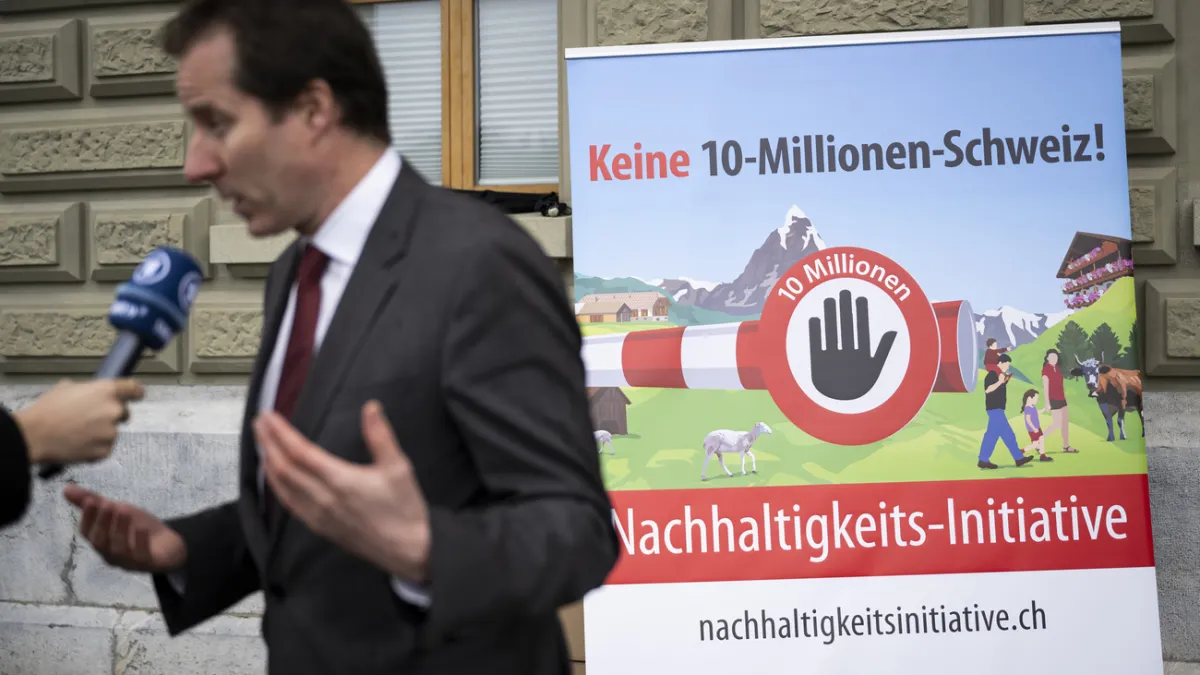 Photo by: Anthony Anex
Photo by: Anthony Anex
In April of 2024, the Swiss People’s Party (SVP) proposed the “No to 10 Million Swiss!” initiative. This initiative is proposing to put a cap on the population of Switzerland at ten million. On March 21st, 2025 the Federal Council argued its rejection of the initiative, and it now resides in parliament for debate.
No to 10 million is specifically calling for Switzerland’s permanent resident population to not exceed ten million by the year 2050, and if it should, then the Federal Council “must terminate the population-suffering international treaties.” On the SVP’s website for the initiative it declares that “every single problem [Switzerland] suffers from has to do with the mass, unregulated immigration.” This document lists issues Swiss voters have been faced with either through recent elections or prevalence in media attention, and cites them as consequences of an overgrown foreign population. The SVP puts forth that any and all struggles facing Swiss people today could be mitigated by implementing this policy directed at one alleged source. The issues include a housing shortage and rising prices of homes, electricity shortage, traffic congestion, and a strain on hospitals–all of which are attributed to an influx of immigration. They also list the ratio of children with Swiss roots to those without in classrooms to emphasize the importance of nativist ideals, by posing the question “who integrates whom?”
The tactic that the SVP is using, where they group a myriad of issues under one commonality of fault, is scapegoating. Scapegoating is a tactic used in order to mobilize support for a particular party or side of the political spectrum. This practice is evident through language used in the initiative’s website, for example, when referring to the housing shortage and prices it says: “whereby the media almost always conceal the true reason.” This language implies to the reader that whoever cites different causes for this issue is doing so to direct you away from the real cause. This particular type of anti-immigration rhetoric is nothing new for the SVP. In the early 2000s following opening borders under Free Movement agreements, right-wing parties adapted the term “density-stress” (Dichtestress) to build a campaign for stricter immigration policies. By emphasizing “density-stress” populist right-wing politicians sought to conjure images of resource scarcity and overcrowding by naming inconveniences such as crowded malls, limited parking, and loss of farmland. In 2014, the SVP launched the initiative “Against Mass Immigration” to implement strict quotas on EU immigration.
In order to discern whether these claims were in fact rhetoric or reflected the issue of overcrowding, a study was conducted on the patterns of traffic congestion following the opening of Swiss borders through the Free Movement of Persons agreement. The study revealed there was no evidence of overwhelming traffic increase in border municipalities (2004-2015), meaning this particular narrative did not reflect a measurable causal relationship. This finding tells us that there is a separate motive behind the SVP’s initiative rather than a concern for a genuine strain on resources and infrastructure.
A study conducted in 2016, examining the increase of support for the anti-immigrant party in Greece (Golden Dawn) following the refugee crisis shows us what the SVP has to gain. Elias Dinas writes that the Golden Dawn party was able to mobilize new voters by converting the negative attitudes towards Muslim asylum seekers into votes during this time of crisis. The SVP has leveraged the increase in immigration to gain supporters, which can be observed through the trend of an increase in anti-immigrant voting during the free movement period (2004-2019). Leading up to the vote on the Against Mass Immigration initiative, supporters cited density-stress rhetoric as a primary reason for how free movement has harmed Switzerland.
In Switzerland, there is a correlation between increased rates of immigration with increased votes for right-wing parties and anti-immigration policies. This relationship serves as a foundation for tracking the success of the Swiss People’s Party in mobilizing xenophobia within the population. While the Swiss population is no more anti-immigrant than other European countries, the far right has successfully politicized the issue of immigration in utilizing Switzerland’s instruments of direct democracy, which has resulted in a louder population of residents calling for restrictions.
Sources
Alrababah, Ala, Andreas Beerli, Dominik Hangartner, and Dalston Ward. “The Free Movement of People and the Success of Far-Right Parties: Evidence From Switzerland’s Border Liberalization.” American Political Science Review, November 25, 2024, 1–20. https://doi.org/10.1017/s0003055424001151.
Armingeon, Klaus, Fritz Sager, Céline Mavrot, and Reimut Zohlnhöfer. “Switzerland Report: Sustainable Governance Indicators 2024.” University of Zurich, 2024. https://doi.org/10.5167/uzh-269854.
Dinas, Elias, Konstantinos Matakos, Dimitrios Xefteris, and Dominik Hangartner. “Waking up the Golden Dawn: Does Exposure to the Refugee Crisis Increase Support for Extreme-Right Parties?” Political Analysis 27, no. 2 (January 31, 2019): 244–54. https://doi.org/10.1017/pan.2018.48.
Lutz, Philipp, and Sandra Lavenex. “Switzerland Comes to Terms With Being a Country of Immigration.” Migration Policy Institute, September 18, 2024. https://www.migrationpolicy.org/article/switzerland-immigration-politics-policy.
Nachhaltigkeits-Initiative. “Initiative – Nachhaltigkeits-Initiative,” September 19, 2024. https://nachhaltigkeitsinitiative.ch/initiative/.
Swissinfo.Ch. “Swiss Government Rejects Initiative to Cap Population.” SWI Swissinfo.Ch, March 25, 2025. https://www.swissinfo.ch/eng/swiss-politics/swiss-government-rejects-initiative-to-cap-population/89049834.

I appreciate the extensive context about how the far-right in Switzerland uses anti-immigration rhetoric to gain public support, which eventually translates to votes. Your piece succinctly explains how politicians use scapegoating to package restrictive immigration policies, such as the “No to 10 Million Swiss!” initiative, in a manner that resonates with the public. Using people’s daily experiences with kitchen table issues like overcrowding and limited movement to mobilize antagonistic attitudes towards immigrants is becoming increasingly more effective for far-right movements globally. Your piece reminded me of the importance of challenging scapegoating tactics that blame immigrants for public issues that the government has more to do with.